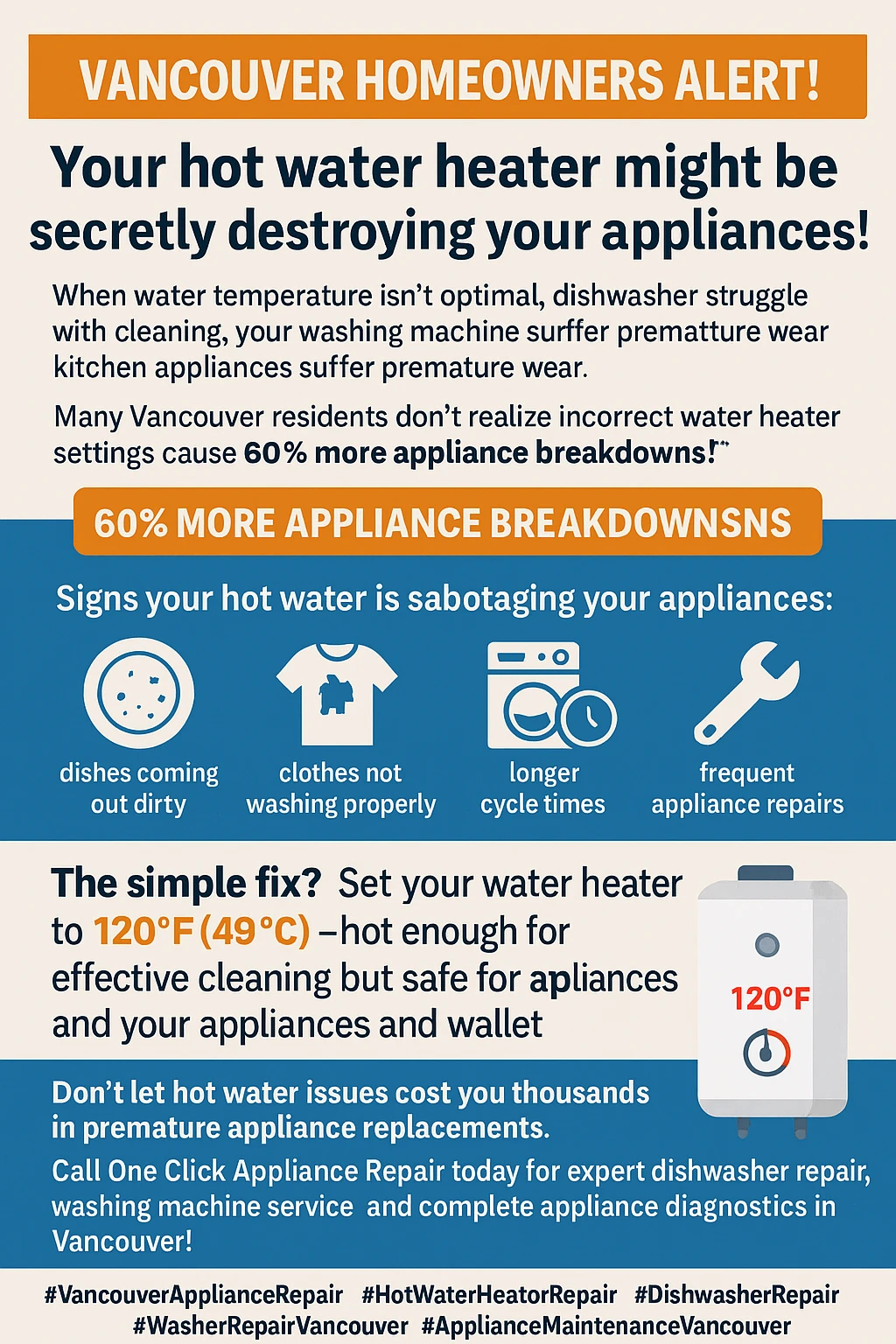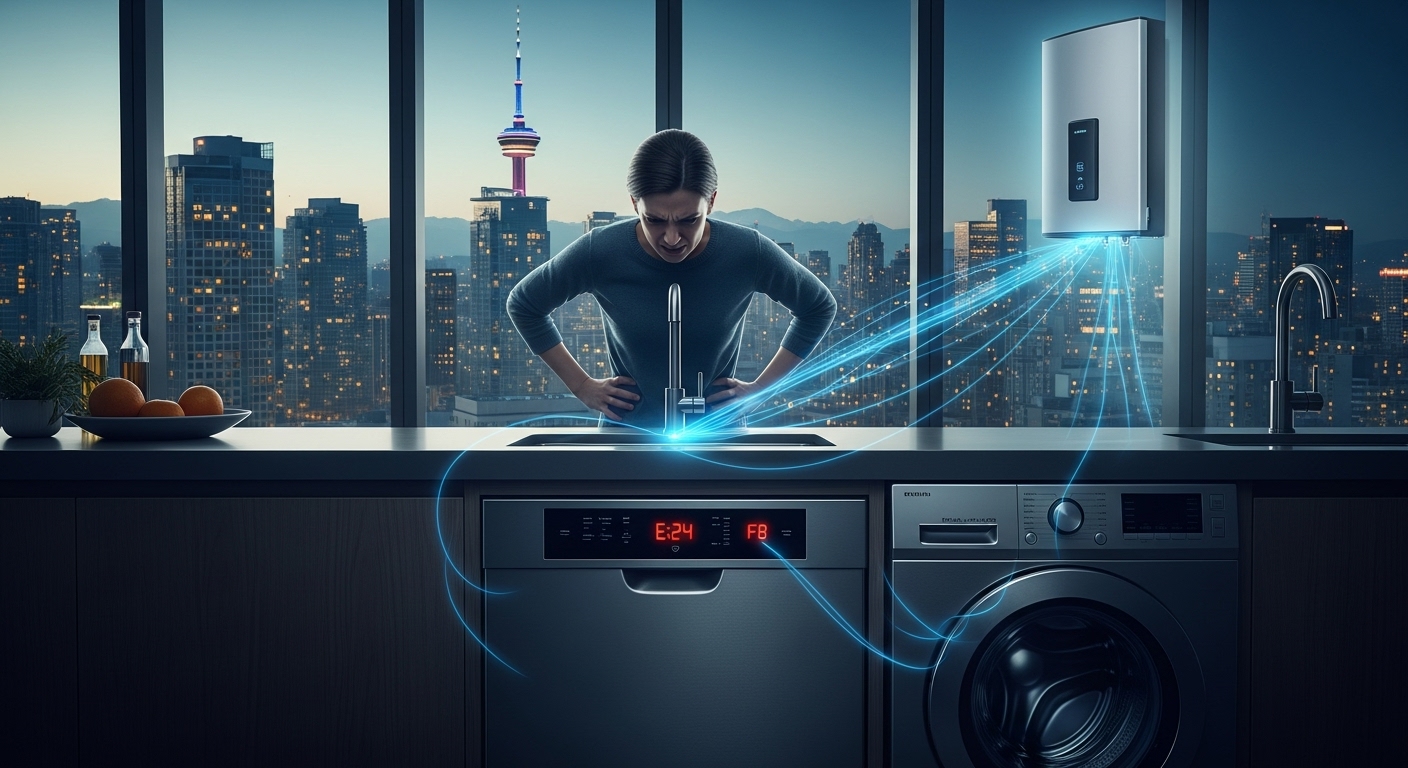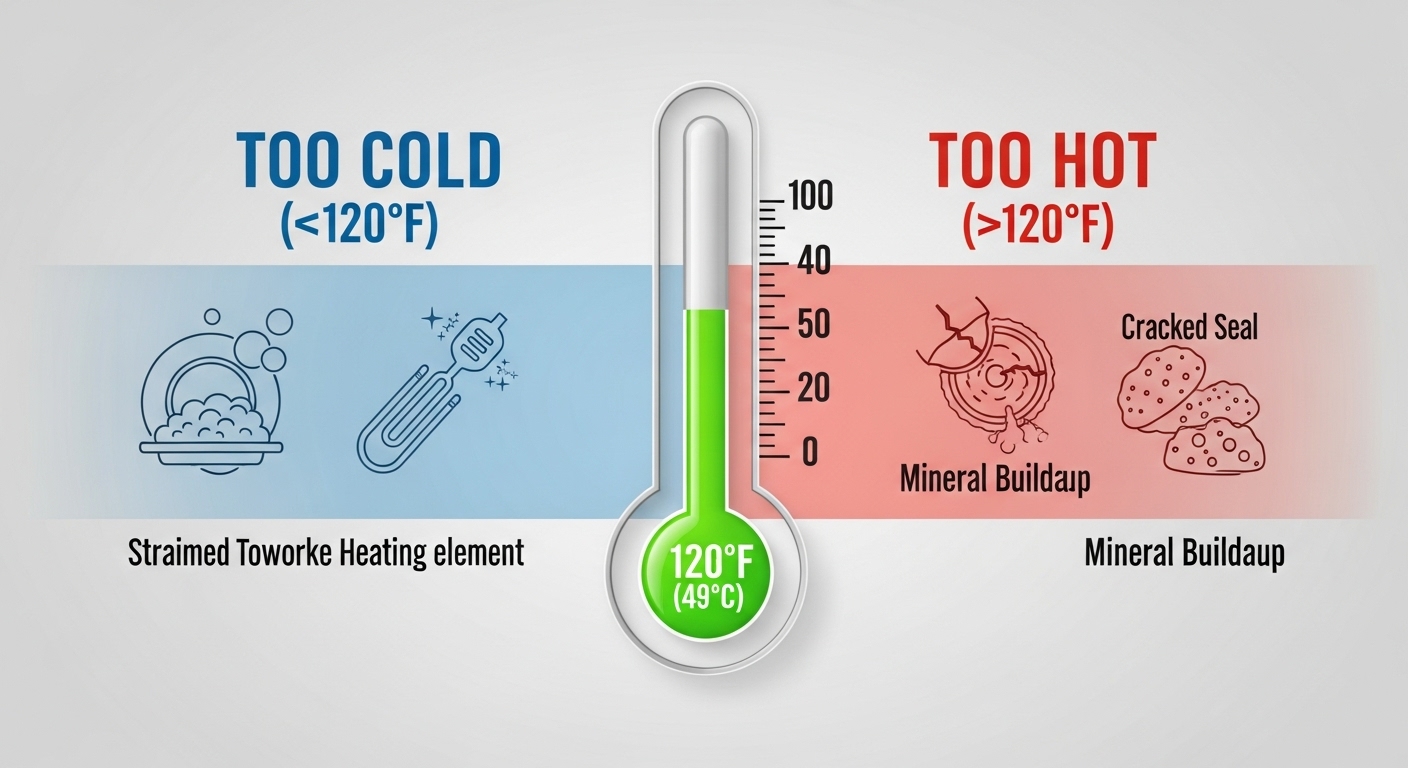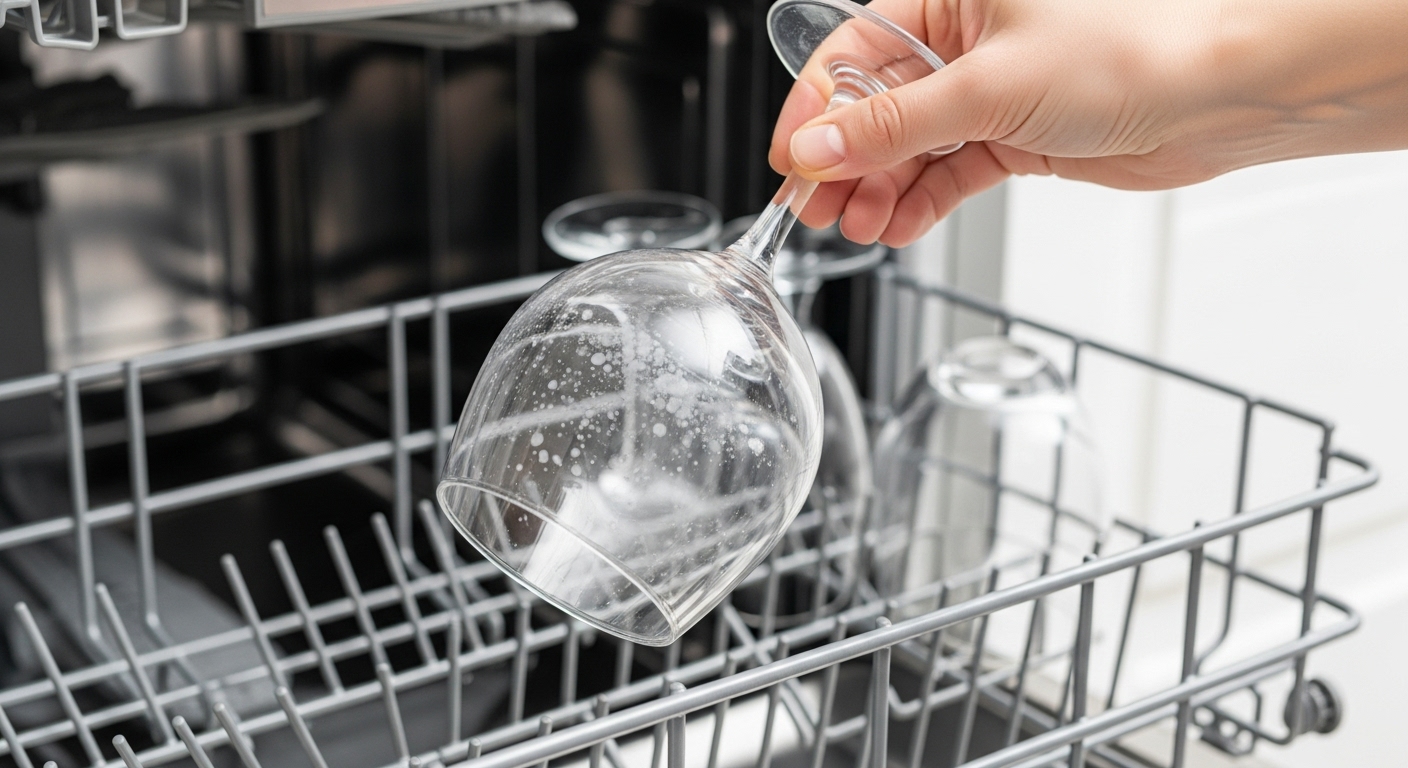Vancouver’s Hot Water Crisis: How Your Hot Water Heater is Secretly Sabotaging Your Dishwasher, Washing Machine, and Kitchen Appliances (Plus the Temperature Fix That Saves Repairs)
Ever wondered why your dishwasher leaves spots on glasses or your washing machine takes forever to heat up during Vancouver’s chilly months? Your water heater might be the silent culprit behind these frustrating appliance failures that are costing you hundreds in unnecessary repairs.
Picture this: you’re rushing to get ready for work on a typical Vancouver morning when your dishwasher decides to quit mid-cycle, leaving you with a sink full of dirty dishes and a repair bill that could easily hit $400. [IMAGE PLACEHOLDER FOR IMAGE1] What you don’t realize is that your water heater has been slowly sabotaging your appliances for months, creating the perfect storm of conditions that lead to premature breakdowns. The coastal city’s unique climate challenges, combined with improper temperature settings and neglected maintenance, are systematically destroying expensive kitchen equipment across Metro Vancouver.
From Richmond’s hard water wreaking havoc on heating elements to North Shore humidity corroding electronic components, Vancouver homeowners face a hidden crisis that’s flying under the radar. Your 10-year-old dishwasher that should last another five years might suddenly fail because your water heater is running too hot, while your washing machine struggles with cold water that never reaches the optimal cleaning temperature. The domino effect of one poorly maintained water heater can cascade through every water-dependent appliance in your home.
This isn’t just about inconvenience – it’s about protecting investments worth thousands of dollars. Modern appliances rely on precise water temperatures for optimal performance, and Vancouver’s challenging environment makes proper water heater management more critical than ever. The good news? Most of these problems are completely preventable with the right knowledge and a few simple adjustments that cost far less than replacing a failed appliance.
Key Outtakes:
- Water heaters set above 120°F can damage appliances while settings below 120°F prevent proper cleaning and sanitization
- Vancouver’s coastal humidity and salt air accelerate appliance component corrosion by up to 40% compared to inland cities
- Sediment buildup from hard water reduces appliance efficiency by 25-30% and can cause complete system failure
- Regular water heater maintenance can prevent 80% of appliance-related problems and extend appliance lifespan by 3-5 years
- Proper water temperature settings can reduce appliance repair costs by an average of $300-500 annually per household

The Hidden Connection: How Your Water Heater Controls Appliance Performance
Most Vancouver homeowners think of their water heater as a standalone appliance, but it’s actually the heart of an interconnected system that affects every water-dependent device in your home. The temperature and quality of water flowing from your hot water tank directly impacts how well your dishwasher cleans, how efficiently your washing machine operates, and how long these expensive appliances will last before needing costly repairs or replacement.
The magic number for optimal appliance performance is 120°F, and there’s solid science behind this recommendation. Dishwashers require water temperature of 120°F as it enters the unit for proper cleaning performance, while temperatures above 150°F can actually damage dishes and interfere with detergent activation.  This sweet spot ensures that dish detergent dissolves completely, grease breaks down effectively, and your dishes come out spotless without subjecting the appliance’s internal components to excessive thermal stress.
This sweet spot ensures that dish detergent dissolves completely, grease breaks down effectively, and your dishes come out spotless without subjecting the appliance’s internal components to excessive thermal stress.
When your water heater runs too cold, appliances compensate by working harder and running longer cycles. Your dishwasher’s heating element kicks into overdrive, your washing machine struggles to dissolve detergent powder, and internal components experience accelerated wear from the extra workload. Conversely, water that’s too hot can cause seals to deteriorate prematurely, create mineral deposits more rapidly, and trigger safety shutoffs that interrupt cleaning cycles.
The relationship between water temperature and appliance efficiency becomes even more critical in Vancouver’s climate. During winter months, incoming cold water temperatures can drop to 6-8°C, forcing your water heater to work significantly harder to reach target temperatures. This temperature differential puts additional stress on both the water heater and connected appliances, creating a cascade of efficiency problems that compound over time.
Understanding this connection is the first step toward protecting your appliance investments. When you realize that your water heater isn’t just heating water but actually controlling the performance and longevity of thousands of dollars worth of kitchen equipment, proper maintenance and temperature management become much more than routine chores – they become essential protection strategies for your home’s most expensive systems.
Vancouver’s Unique Climate Challenge: Why Your Appliances Fail Faster Here
Living in Vancouver means dealing with environmental factors that most appliance manufacturers never considered during product development. The combination of persistent coastal humidity, salt-laden ocean air, and dramatic temperature fluctuations creates conditions that can reduce appliance lifespans by decades compared to drier, more stable climates. Your expensive kitchen equipment is essentially fighting a three-front war against moisture, corrosion, and thermal stress every single day.
The moisture that makes Vancouver’s landscape so lush is simultaneously infiltrating your appliances and promoting internal corrosion. High humidity levels seep into electronic components, causing circuit boards to corrode and sensors to fail prematurely. Research indicates that comprehensive moisture protection strategies can extend appliance lifespans by 3-5 years while dramatically reducing repair frequency. This isn’t just theoretical – local repair technicians consistently report higher failure rates for electronic components in Vancouver compared to inland cities.

Salt air presents an even more insidious threat to modern appliances packed with sophisticated electronics. The ocean breeze that makes Vancouver’s climate so pleasant carries microscopic salt particles that settle on and penetrate appliance components. These particles accelerate oxidation processes, causing metal components to corrode faster and electronic connections to fail unexpectedly. Smart appliances with their complex sensor arrays and Wi-Fi connectivity are particularly vulnerable to this coastal assault.
Perhaps most challenging are Vancouver’s constant temperature swings. Unlike prairie provinces where winter temperatures stay consistently below freezing, Vancouver’s coastal climate creates daily temperature fluctuations that put tremendous thermal stress on appliance components. Materials expand and contract repeatedly, causing seals to crack, connections to loosen, and joints to fail. This constant thermal cycling is particularly hard on water-connected appliances that experience temperature differentials both from ambient air changes and varying water temperatures.
The microclimate effect within Metro Vancouver adds another layer of complexity. False Creek’s urban heat island effect creates different stress patterns than North Shore elevation changes, while Richmond’s proximity to the Fraser River creates unique humidity challenges. Understanding your specific neighborhood’s microclimate helps tailor maintenance strategies to address the particular environmental stresses your appliances face daily.
The Dishwasher Dilemma: When Hot Water Isn’t Hot Enough (Or Too Hot)

Your dishwasher represents the perfect example of how water heater problems cascade into appliance failures. Modern dishwashers are engineering marvels designed around precise water temperature requirements, but they’re also surprisingly vulnerable to temperature inconsistencies that can cause both immediate performance problems and long-term component damage. Getting the temperature wrong doesn’t just mean spotty dishes – it can mean premature replacement of an appliance that should last 10-15 years.
Standard ENERGY STAR certified dishwashers use an average of 3-5 gallons of hot water per commonly used cycle, making them heavily dependent on consistent water heater performance. When water entering the dishwasher falls below 120°F, several problems occur simultaneously. Detergent pods fail to dissolve completely, leaving residue on dishes and potentially clogging spray arms. Grease doesn’t break down effectively, leading to redeposit on supposedly clean dishes. Most critically, the dishwasher’s internal heating element must work overtime to compensate, leading to premature burnout of this expensive component.
The detergent activation issue deserves special attention because it creates a vicious cycle of poor performance. Modern dishwasher det



